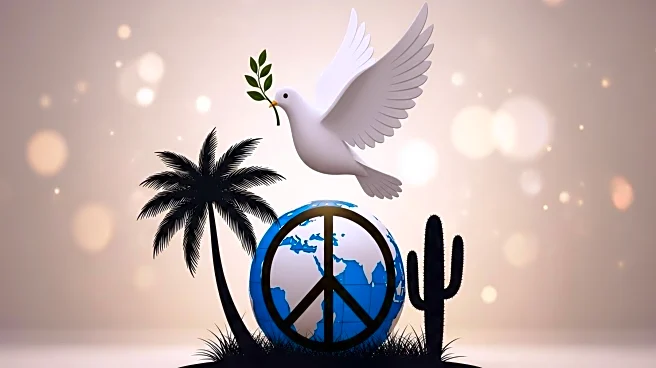What's Happening?
President Trump has successfully brokered a ceasefire agreement between Israel and Hamas, ending a two-year conflict in Gaza. The deal was achieved through a coalition that included major Arab and European nations, as well as Israel and Hamas. Trump, known for his go-it-alone approach, demonstrated flexibility by listening to expert advice and engaging in secret diplomacy, particularly with Qatar. The ceasefire agreement follows a series of negotiations involving key figures such as Tony Blair, Jared Kushner, and Ali al-Thawadi from Qatar. The agreement includes a 20-point plan for a ceasefire and a 'Board of Peace' to oversee the political transition in postwar Gaza.
Why It's Important?
The ceasefire deal marks a significant diplomatic achievement for President Trump, potentially altering the geopolitical landscape in the Middle East. It brings relief to the region, which has been plagued by violence and instability. The agreement could enhance Trump's reputation as a dealmaker and influence future U.S. foreign policy in the region. However, unresolved issues such as the disarmament of Hamas remain, posing challenges to the long-term success of the peace plan. The involvement of Qatar and other Arab nations in the negotiations highlights the importance of regional cooperation in achieving peace.
What's Next?
While the ceasefire is a positive development, the peace plan's success depends on the resolution of key issues, including Hamas's disarmament. Continued negotiations are expected, with stakeholders such as Israel, Hamas, and regional powers playing crucial roles. The 'Board of Peace' will oversee the political transition in Gaza, and further diplomatic efforts will be necessary to ensure stability. The international community will closely monitor the situation, and any obstruction to the peace deal could lead to renewed tensions.
Beyond the Headlines
The ceasefire deal underscores the complex nature of Middle Eastern diplomacy, where transactional negotiations often prevail. The involvement of Qatar, despite recent tensions with Israel, demonstrates the strategic importance of maintaining diplomatic channels. The agreement also reflects the shifting dynamics in U.S. foreign policy under Trump's leadership, emphasizing pragmatic dealmaking over traditional diplomatic approaches.









